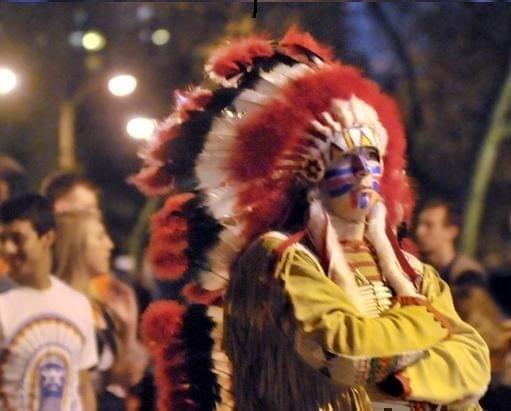‘Critical Conversations’ Events Aim To Bridge Divide Over Chief Illiniwek

A student portraying the retired Chief Illiniwek. Honor the Chief Society
Eleven years after University of Illinois administrators stopped appearances by Chief Illiniwek and barred use of the Chief logo, the debate between supporters and opponents continues. Some say he's an honored symbol that should be preserved, while others argue he’s a racist stereotype that had to go.
Chancellor Robert Jones says he wants to see the campus move forward without the Chief.
A panel discussion held Tuesday afternoon focused on Native American imagery in the campus community. The event marked the the first in a series of campus talks — dubbed “Critical Conversations” — aimed at promoting dialogue on controversial issues. The panel featured two speakers: Dan Maloney and Kevin Grover.
Maloney is a graduate of the U of I and the last officially recognized Chief Illiniwek portrayer. His last performance as the Chief was during a 2007 men’s basketball game.
Maloney said he wanted to clear up historical misconceptions about the tradition of the Chief. He said the dances and public performances were only a small fraction of the Chief's role, and that Chief portrayers also took part in self-study about native history and spoke to the public about the tradition.
Grover is the director of the National Museum of the American Indian and a member of the Pawnee Tribe of Oklahoma. He formerly worked as assistant secretary for Indian Affairs with the U.S. Department of the Interior.
Grover presented a brief overview of the fraught relationship between white Americans and Native Americans over the past two centuries. He said that instead of universities having mascots with the stated purpose of honoring Native Americans, a better approach would be to help serve Native communities in more practical ways, by addressing the "great needs" they continue to have.
The panelists’ remarks were followed by small group discussions that were closed to the media.
About 200 people attended the event. University spokeswoman Robin Kaler said the audience included roughly 60 percent faculty and staff, 20 percent students, and 20 percent community members.
U of I student body president Raneem Shamseldin, who helped organize anti-Chief protests in the past, attended the panel.
“No one said anything that hasn’t been said before,” she said. “There were no amazing brand-new ideas that came up at this event.”
Some groups favored finding a new mascot, she said.
“We need to consider whether that’s the most effective way to move forward,” Shamseldin said. “If we’re not going to get a new mascot right away, what are some new traditions we can start?”
Champaign resident and U of I employee Breelyn Fay, who said she's of Shawnee descent, shared her desire to bring back a more respectful version of the Chief.
Fay said she would like to see a strong partnership between the university and the Peoria Tribe — descendants of the Illini who are now in Oklahoma — and get their input “on what the Chief should wear, how the dance should look, and how the symbol should go forward with the U of I.”
But she said she felt the event didn’t give her an opportunity to share her vision.
“The Chancellor has it already set up to move forward without the Chief. So it’s really still hard to be heard,” she said. “Taking the Chief off the table right up-front was not exactly having an open dialogue.”
Shamseldin is a member of the “Critical Conversations” advisory board. She said all the feedback from the group discussions will be analyzed and recommendations will be made to Chancellor Robert Jones based on what participants shared.
She said it’s too soon for her to judge whether the event was successful, and she’s waiting to see what action the administration takes.
Jones said the format of the event was modeled after one he's used at other universities. He said the event structure can break down barriers that often separate people on contentious issues.
Chief Illiniwek “continues to be the most divisive and challenging issue we face as a community,” Jones said. “We simply cannot afford another decade of this level of divisive and self-destructive discourse. We must find a way to move forward together.”
A follow-up conversation on the topic of free speech will take place on Tuesday, April 17 at 1 p.m. at the Krannert Center for the Performing Arts in Urbana. The speakers include Erwin Chemerinsky, dean of the law school at the University of California, Berkeley, and Geoffrey Stone, a former law school dean and provost at the University of Chicago. Following the presentation, audience members can submit questions during the moderated Q&A period.
Administrators say additional events will be planned once they’ve had a chance to look over the feedback from these initial conversations.
Follow Christine on Twitter: @CTHerman
